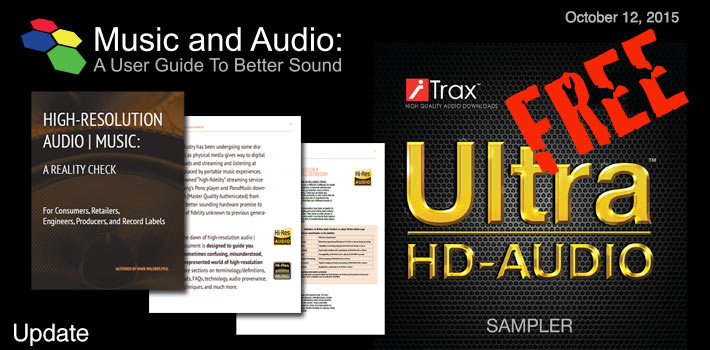MQA and CD Quality: A Couple of Questions
Jason Victor Serinus posted an article about a press conference that was held at the recent Rocky Mountain Audio Fest. I’m sorry I missed it. The title of the event was “MQA and Mytek Present: From Studio To Home” and it featured Bob Stuart of MQA, Ltd., the co-inventor of the technology, and Michal Jurewicz of Mytek. I wrote a blog post on my meeting with Michal a week or so ago about his new DAC. You can check out that post by clicking here. The new article includes more information about the collaboration between the two companies mentioned above and Tidal and AudioQuest.
I’m still waiting for Bob to get back to me with answers to questions that I posed via email back in June. I’ll have to reach out to him once again as more information starts to become available about the technology.
A reader quoted the article and sent me a heads up email. According to Jason, Bob Stuart stated the following at the press event, “You can take an MQA-encoded file, play it anywhere, and it will sound better than CD.”
That’s a bold statement to make. I would need to have some clarification on the provenance of any music track making its way to a CD or an MQA-encoded file. If the original recording was done on analog tape (which may in rare cases exceed the fidelity of a compact disc…but usually doesn’t) and was then digitized at 44.1 kHz/16-bits, all of the fidelity would be present…assuming optimal transfers, a great ADC, and proper clocking etc. To compare the CD to an MQA’d file would mean that the record company went back to the original source analog master and transferred it again with detailed knowledge of the ADC parameters that were used. The MQA process would then apply that knowledge to minimize any fidelity loss that could happen between the new transfer and the playback at home. That’s the “authenticated” part of MQA.
As I understand MQA, there isn’t any improvement or enhancement in the resulting file…just tighter specs and less loss from source to delivery. So to claim that any MQA-encoded file will sound better than a CD seems a stretch to me. I understand that marketing and promotion are different than the science stuff and specs but a great sounding CD probably doesn’t need MQA. The record companies are not likely to go back and redo all of their transfers again just to please audiophiles.
I’ve heard various assertions about MQA from qualified individuals that ask some meaningful questions. Here’s a segment of one of them:
“The value of the MQA system is that it can convey an extended frequency response and a better than 16-bit SNR over the 0 to 20 kHz frequency region while achieving a respectably low data rate. This is the first lossy format that attempted to capture an extended bandwidth. I suspect the band above 20 kHz has a reduced SNR.”
MQA will have very specific benefits to companies like my own and 2L, companies that actually deliver content with higher frequencies and greater than CD signal to noise ratios. But it might not help the huge catalogs of the major labels because their content doesn’t reach high-resolution standards.
+++++++++++++++++++++++++++++++++++++++++++++++++++++++++++++++++++++++++++++++++++++++++++++++++++
7 Days and counting down for the “Music and Audio” A User Guide To Better Sound”. If you’ve been waiting for the right time to join the over 640 backers, now it that time. I’ve added a second stretch goal. Check it out by clicking here.



” But it might not help the huge catalogs of the major labels because their content doesn’t reach high-resolution standards.”
Humm, hasn’t stopped the labels from making high-rez marketing claims in the past. LOL I predict you’ll see the MQA label pasted to everything from downloads with unreleased provenance, Tidal type high bandwidth streaming, narrow bandwidth streaming if it can be applied, hard media such as CD’s using MQA coding as a replacement for the high rez SACDs, AudioDVD’s, etc, etc, etc.
MQA is poised to be a huge sales tool used anywhere and everywhere possible. Seen it coming since the John Atkinson article at Stereophile and the rest. Bob Stuart has told you that MQA was not a SQ enhancement tool but more a very good data reducing codec and that he would get back to you with all the details, but that was 5 months ago. It’s taking a little longer to create that three sided marketing spin than they thought. LOL Now we see they’re telling who ever the interviewer is whatever they want that market to hear.
MQA is a great new technology, but it’s going to set new levels for inventive sales promotion. It has to, the numbers are just too attractive. 🙂
Mark,
Maybe you can ask Bob Stuart where this statement:
“CD smears timing for 4 milliseconds”
is coming from and under what conditions. Intersample duration for 44.1kHz is already 23 microseconds.
I will…thanks. I think there’s a lot of hype going on with some technologies and recent software inventions. MQA is an interesting technology but I don’t think it going to do anything for me.
So left me just see if I understand MQA correctly, To summarize the bottom line here – it is a lossy compression scheme for streaming hi-resolution bit buckets. And, why would I be interested in this?
Given that the stuff being streamed is not high-resolution…you wouldn’t. And neither am I.
Our team was only able to stay for half of the MQA / Mytek presentation. We did stay long enough to hear the Sinatra track and the 2L piano track which were said to be MQA encoded. While they both sounded wonderful, they didn’t have un-encoded versions of the same songs to compare back to back so I really had no way to tell what the level of improvement was. It just struck me as an odd way to try to sell us on the benefits of MQA where all we were left with was to take their word for it.
The Sinatra and 2L tracks would have sounded identical to the unMQA’d version on a great system with a great transfer.
Here is a link to an extensive explanation from Bob Stuart on the MQA system. I haven’t had the opportunity to read all of it yet, but it may help to answer some of the questions that have been discussed.
http://www.stereophile.com/content/mqa-questions-and-answers#6yiZe58XCzQxfrTv.97
I read most of this and the other interview with Spencer Chrislu, MQA’s Director of Content Services. I’ve also been waiting since January of 2015 for some MQA’d versions of recording that Robert Stuart requested of me at that time. Despite repeated emails and in person discussions, it seems as though they won’t be coming through on their promises. I’m disappointed because the amount of hype and hyperbole about how MQA “enhances” the fidelity of the source masters is overdone, so say the least. MQA requires that every track of every album be newly transferred and encoded. It is lossy. If you play an MQA encoded file and don’t have an MQA enable playback device, the fidelity will be less than the same file without the encoding. The size of an MQA processed file is larger than a 96/24 FLAC file, which will play everywhere and sound better. I really don’t understand how anyone — especially the folks at the big magazines — can ignore the realities of this “revolutionary” technology. It’s a solution in search of a problem, IMHO.
Hi Mark,
It’s been a while since I had anything substantive to say about audio developments. In our store, I have been listening to fully unfolded MQA’ed 24 bit files streaming hard-wired from Tidal. I have to say that the sound is free of all the anomalies associated w/ digital recording/playback. No artifacts that cause the ears to “squint” , the music flows easily, sonic textures and colors are as natural as I’ve heard or better.All aspects of dynamics are properly managed as well, micro-macro. I can only report what my ears heard on a very good system as well as lower-end gear here.
Happy New Year Craig! Indeed it has been a while. I’m glad you’re enjoying the TIDAL streams. Your description of having to “squint” when listening to digital music brings up alert flags for me. Do you have to “squint” when you hear one of my recordings? They are digital as well. MQA is not designed (according to the man who invented it who I interviewed for my book) to improve the fidelity of the recordings. It’s only goal is to preserve the fidelity of the original.